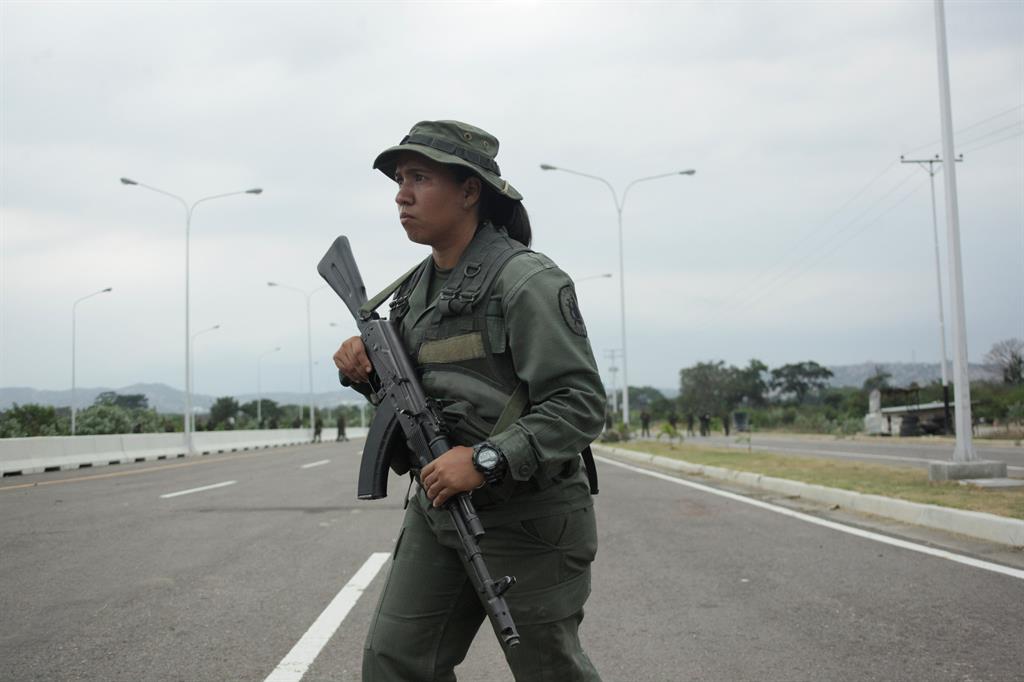Humanitarian aid used as weapon in Maduro-Guaido conflict
Desperately needed aid being stockpiled at Venezuela's door is at the heart of a political duel between the two men fighting to lead the oil-rich nation: Juan Guaido and Nicolas Maduro.
Guaido, recognised as Venezuela's interim president by around 50 countries, has pressed the all-critical military to allow the mostly American humanitarian aid to reach the most vulnerable population, or around 300 000 people.
Maduro insists the shortages plaguing the country are caused by Washington's punitive sections, and he has vowed to stop the “spectacle of fake humanitarian aid.”
The aid “is at the heart of the struggle between two pillars of power,” political scientist Luis Salamanca told AFP.
“This struggle is playing out as concerns the future of the armed forces. Guaido is trying to get the military on his side, while Maduro tries to keep it behind him.”
Using a tanker truck, two container trucks and barriers, the army has been blocking the Tienditas border bridge since Thursday.
Several hundred metres (yards) from there on the Colombia side are the hangars where the emergency aid is being stockpiled.
For John Magdaleno of the Polity consultancy, the confrontation between the two men is a “major event” that “is inevitably leading toward an escalation” between the government and the opposition, as well as between Maduro and the countries supporting his adversary.
“In the end, it's in the hand of the United States. They are the ones who can use force,” Magdaleno said.
President Donald Trump's administration, which has insisted that “all options are on the table”, has frozen the accounts of Venezuelan leaders and unveiled fresh sanctions to bar Maduro from accessing revenues from oil his country sells in the US.
Before possibly resorting to force, Washington is exploring “all other options” first, Magdeleno said, adding that “this chapter on humanitarian aid foreshadows a far more significant escalation that could trigger a military intervention.” However, Assistant Secretary of State for Western Hemisphere Affairs Kimberly Breier has insisted that the US has no intention of entering Venezuelan territory by force to distribute food and medicine. The United Nations said it's ready to send emergency aid to Venezuela, but only if Caracas agrees.
“Humanitarian aid should never be used as a political pawn,” UN spokesman Stephane Dujarric said Thursday. Venezuela has faced a major political and economic crisis in recent years. Expropriations have hurt industry and oil production, which finances 96% of the national budget, thus reducing imports of basic goods.
More than 80% of medicine and medical equipment are missing in a country that has the world's largest proven oil reserves, according to the pharmaceutical federation. There are constant cuts of basic services such as water and electricity.
Maduro accuses the United States of setting up an “international coalition... to intervene militarily in Venezuela under the pretext of a non-existing humanitarian crisis.”
NAMPA/AFP
Guaido, recognised as Venezuela's interim president by around 50 countries, has pressed the all-critical military to allow the mostly American humanitarian aid to reach the most vulnerable population, or around 300 000 people.
Maduro insists the shortages plaguing the country are caused by Washington's punitive sections, and he has vowed to stop the “spectacle of fake humanitarian aid.”
The aid “is at the heart of the struggle between two pillars of power,” political scientist Luis Salamanca told AFP.
“This struggle is playing out as concerns the future of the armed forces. Guaido is trying to get the military on his side, while Maduro tries to keep it behind him.”
Using a tanker truck, two container trucks and barriers, the army has been blocking the Tienditas border bridge since Thursday.
Several hundred metres (yards) from there on the Colombia side are the hangars where the emergency aid is being stockpiled.
For John Magdaleno of the Polity consultancy, the confrontation between the two men is a “major event” that “is inevitably leading toward an escalation” between the government and the opposition, as well as between Maduro and the countries supporting his adversary.
“In the end, it's in the hand of the United States. They are the ones who can use force,” Magdaleno said.
President Donald Trump's administration, which has insisted that “all options are on the table”, has frozen the accounts of Venezuelan leaders and unveiled fresh sanctions to bar Maduro from accessing revenues from oil his country sells in the US.
Before possibly resorting to force, Washington is exploring “all other options” first, Magdeleno said, adding that “this chapter on humanitarian aid foreshadows a far more significant escalation that could trigger a military intervention.” However, Assistant Secretary of State for Western Hemisphere Affairs Kimberly Breier has insisted that the US has no intention of entering Venezuelan territory by force to distribute food and medicine. The United Nations said it's ready to send emergency aid to Venezuela, but only if Caracas agrees.
“Humanitarian aid should never be used as a political pawn,” UN spokesman Stephane Dujarric said Thursday. Venezuela has faced a major political and economic crisis in recent years. Expropriations have hurt industry and oil production, which finances 96% of the national budget, thus reducing imports of basic goods.
More than 80% of medicine and medical equipment are missing in a country that has the world's largest proven oil reserves, according to the pharmaceutical federation. There are constant cuts of basic services such as water and electricity.
Maduro accuses the United States of setting up an “international coalition... to intervene militarily in Venezuela under the pretext of a non-existing humanitarian crisis.”
NAMPA/AFP





Comments
Namibian Sun
No comments have been left on this article